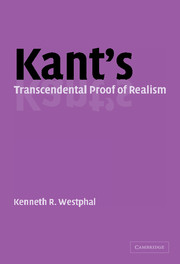Book contents
- Frontmatter
- Contents
- Acknowledgments
- List of abbreviations
- Introduction
- 1 Kant's methods: transcendental and epistemic reflection
- 2 The metaphysics of Kant's transcendental idealism
- 3 Transcendental affinity
- 4 The gap in Kant's Critique of Pure Reason
- 5 Kant's dynamic misconstructions
- 6 Kant's metaphysical proof of the Law of Inertia
- 7 Three Kantian insights
- Appendix
- Bibliography
- Index of names
- Index of subjects
3 - Transcendental affinity
Published online by Cambridge University Press: 06 November 2009
- Frontmatter
- Contents
- Acknowledgments
- List of abbreviations
- Introduction
- 1 Kant's methods: transcendental and epistemic reflection
- 2 The metaphysics of Kant's transcendental idealism
- 3 Transcendental affinity
- 4 The gap in Kant's Critique of Pure Reason
- 5 Kant's dynamic misconstructions
- 6 Kant's metaphysical proof of the Law of Inertia
- 7 Three Kantian insights
- Appendix
- Bibliography
- Index of names
- Index of subjects
Summary
INTRODUCTION
The Critique of Pure Reason originated both transcendental idealism and transcendental proofs. The exact relation between them, however, has not been adequately analyzed. Transcendental analysis and proof in epistemology aim to establish a thesis to the effect that some universal, though philosophically controversial, feature of objects, such as their being spatial or substantial, is a condition necessary for our having experience of them at all, or for our having self-conscious experience at all (chapter 1). Transcendental idealism holds that such universal conditions necessary for our self-conscious experience or for our perception of objects do not hold independently of human subjects; those conditions obtain or are satisfied because they are generated or fulfilled by the structure or functioning of the subject's cognitive capacities (chapter 2). Thus transcendental idealism can be invoked to explain the necessary conditions of self- conscious experience, conditions established by transcendental arguments. Is transcendental idealism the only possible explanation of such conditions? What, exactly, is the relation between transcendental arguments and transcendental idealism?
I pursue this question by exploring the transcendental affinity of the sensory manifold. I contend that: (1) This issue remains vital to the B edition, even though it omits many passages on this topic from the first edition; (2) Kant's link between transcendental idealism and transcendental arguments is substantive, not methodological; (3) Kant's analysis of “transcendental affinity” (for short) shows that there is a transcendental, but nonsubjective, condition for the possibility of unified self-conscious experience which is both material and formal, though neither intuitive nor conceptual; (4) This condition and Kant's arguments for it directly undermine Kant's own arguments for transcendental idealism.
- Type
- Chapter
- Information
- Kant's Transcendental Proof of Realism , pp. 68 - 126Publisher: Cambridge University PressPrint publication year: 2004



